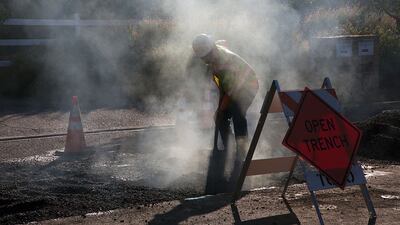As Texas baked in this summer's record temperatures, local UPS driver Chris Begley started feeling unwell before collapsing at a customer's premises. The 57-year-old's death in hospital was announced in late August – right as his trade union was ratifying a deal with UPS on improved heat protections.
“Chris Begley should still be alive to experience them,” the Teamsters union said in a statement of provisions such as a promise to include air conditioning in new delivery vans from next year and to retrofit existing vehicles.
In a statement to local media, UPS said it was co-operating with the authorities as they investigated the cause of death.
“We train our people to recognise the symptoms of heat stress, and we respond immediately to any request for help,” it said.
As global warming leads to more frequent spells of extreme heat around the world, workers are among the most exposed to serious health risks because their livelihoods often depend on them carrying on regardless.
At the same time, studies show that productivity starts to be impaired at temperatures above 24°C-26°C and, for some tasks, slashed by half from about 33°C-34°C – levels repeatedly exceeded in a year which included the hottest July on record.
“Unlike some occupational health and safety risks you see a direct impact [from heat] on the health of workers and a direct impact on productivity,” said Halshka Graczyk, a specialist on the issue at the International Labour Organisation.
“So does it make sense for the employer to keep a job site running that day if it is more than 35°C and productivity is less than 50 per cent of what they are expecting?” Ms Graczyk said of an awkward cost-benefit ratio that more workplaces will start to face.
Even on the optimistic assumption that the world hits its Paris Agreement goal of capping warming at 1.5°C, productivity losses will amount to 2.2 per cent of global work hours or $2.4 trillion in output by 2030, the ILO estimates.
But finding the point at which employer costs can be minimised without compromising worker welfare is all the harder given the lack of clear data, uneven regulation and the unequal way that workers around the world will experience heat stress.
Not surprisingly, white-collar workers in air-conditioned offices will be less affected: the big impact will remain initially on outdoor workers in sectors from construction to agriculture and in particular those in the Global South.
Among the most exposed will be the world's 170 million migrant workers. Chaya Vaddhanaphuti, a researcher at Chiang Mai University in Thailand, said his studies on migrant workers from Myanmar underlined their vulnerability.
“These labourers tend to display extra stoicism and endurance – partly because they need to show to their Thai bosses that they can work and hence still get hired,” he said.
“This puts them in more danger during the heatwave period and they often lack any paperwork or access to medical services.”
An internationally agreed on ILO convention grants workers a right to leave a workplace without fear of retaliation if they have “reasonable justification” to believe they are in danger – but labour advocates say few workers know of the convention or dare use it.
Many European and other usually temperate countries still have no laws establishing maximum work temperatures. Where they exist – such as in China, with its decade-old 40°C cap – monitoring and enforcement is patchy.
Often that is because workplace regulators lack resources: the US Occupational Health and Safety Authority would need 165 years to check each workplace in its remit, estimates labour advocacy group National Employment Law Project.
“There has to be both carrots and sticks – and without enforcement there are not enough sticks,” said Anastasia Christman, senior policy analyst at the NELP.
While work temperature caps may prevent some casualties, they do not account for the fact that workers experience stress differently, according to their job role and health profile.
“The number on the thermostat is not as crucial as assessing the risks and talking to the workforce,” said Owen Tudor, deputy general secretary of the International Trade Union Confederation.
Consultations might yield relatively cheap fixes: Mr Tudor cited the example of a meatpacking plant which had found it could reduce heat transfer from worker to worker simply by spacing them out more.
Other solutions have wider societal repercussions. The oft-cited switching of work hours to the cooler hours of early morning or late evening leaves workers having to rearrange childcare or facing limited public transport options.
Automation will have a role to play. French winemaker Jerome Volle harvested before dawn this year – mechanising much of the process – to avoid daytime temperatures of 42°C which, he told Reuters, “strain both plant and worker”.
Heat exposure is already emerging as a source of worker grievance – be it the strikes by staff at the Greek Acropolis tourist site in July, or the successful suing of a Chinese employer last year for the heat stroke death of a cleaner.
As temperatures rise further, pay and performance practices currently favoured in some sectors – for example piece work and output targets that discourage workers from taking rest breaks – may prove indefensible. And if an extreme weather event like a tornado destroys a factory, should workers still get paid?
“Climate change is such a paradigm shift that all of us need to rethink these legacy economic assumptions,” said NELP's Ms Christman. “Just doing workplace protection standards won't be enough.”

